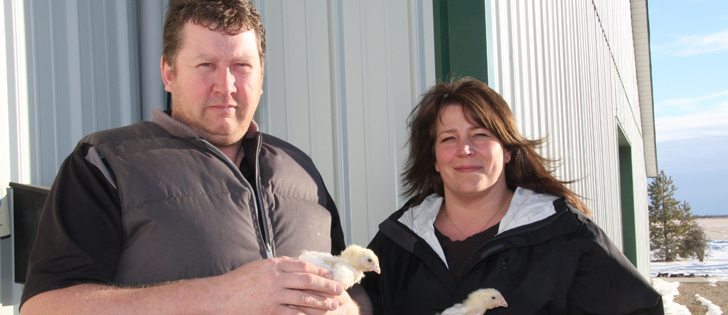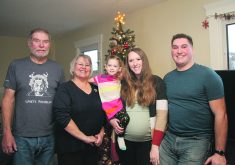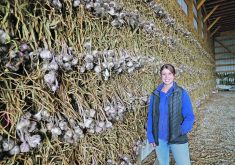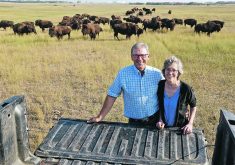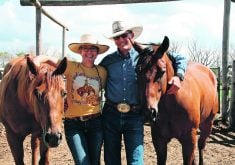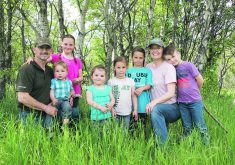B.C. family moves to Saskatchewan
DALMENY, Sask. — Diane and Mark Pastoor desperately wanted to be dairy farmers.
Both were raised on dairies in the Abbotsford, B.C., area and entering that industry seemed a natural fit.
“We dreamed of cows,” Diane said.
But it was chicken production and a move that got them on their own farm.
In British Columbia, Mark worked as a dairy herdsman and Diane stayed at home with their young children.
After seven years as a couple, they bought her parents’ herd and leased more quota. In the seven following years, the family and their cows moved three times in pursuit of their goal. At times, the couple was milking 120 cows.
Read Also

Agri-business and farms front and centre for Alberta’s Open Farm Days
Open Farm Days continues to enjoy success in its 14th year running, as Alberta farms and agri-businesses were showcased to increase awareness on how food gets to the dinner plate.
But quota was getting more expensive and their dream looked unattainable. Saskatchewan, with its more reasonable quota and land prices, began to look attractive.
Their search for opportunity led them to a different sector, and in 2003 the family purchased a broiler chicken operation near Dalmeny from a group of B.C. investors.
“We were nervous about chicken,” Diane said. “But we were very glad to own our own farm.”
Chicks R Us Poultry, a reference to the couple’s four daughters, Shawna, twins Brandee and Breanna and Stephanie, was born. The family now also includes granddaughter Madison.
Initially, Mark worked two off-farm jobs managing another chicken operation and unloading rail cars full of animal feed ingredients at nearby Langham to help make ends meet. Diane said their lender, Farm Credit Canada, would not allow them to draw an income off their own farm for the first five years because they were too strapped financially.
When they were on their feet and able to build a third barn, Mark gave up those jobs and devoted himself to his own farm.
In fact, he built the barn and understands exactly how the systems inside work. Twice a day, he goes through to make sure the feed and water systems are working and the birds are well.
A back-up generator kicks in if the power goes off.
“They would suffocate in half an hour, 45 minutes because the heat builds up,” Mark said.
The barns hold 110,000 birds per cycle or about 37,000 birds per barn, and they put through 6.5 cycles each year.
Chicks arrive in Dalmeny from the hatchery only hours old and are shipped out within 35 to 39 days, depending on the processor’s re-quirements.
All broiler chicken farms operating under Canada’s supply managed system of quotas and tariffs are free run. Biosecurity measures are in place through on-farm food safety programs, and animal care regulations are in place to govern the number of birds in a certain space and other practices.
The birds have access to food and water at all times. No hormones are used, despite what some might claim.
“That’s where we’ve failed to educate,” Diane said. “Hormones have been illegal since the ’60s.”
But improvements in feed and genetics mean the birds do grow faster than they once did.
The Pastoors usually produce Ross 308 birds, and sometimes Cobbs. The Ross 308 is preferred for breast yields, straight legs and good bones, Diane said.
The birds are not force-fed, which is another myth with which the industry has to deal.
They are kept in climate controlled, well ventilated barns. Lighting is controlled to keep the birds calm and boost productivity.
Chicks enter a dimly lit, warm barn and as they grow, the temperature comes down and the ventilation increases.
“We go through quite a bit of heat,” Mark said.
Air also keeps the litter dry.
Broilers are raised on an all-grain diet. To keep costs in check, Mark adds whole wheat to pelleted rations from a feed company.
“I like to buy from local farmers,” he said.
Diane notes they didn’t even know a grain farmer before moving to Saskatchewan.
The meat from wheat-fed chickens is paler in colour than corn-fed chicken, and processors want a consistent product.
The Pastoors also buy straw bedding from local Hutterites. The litter is composted and spread on their own hay land. Mark sells the resulting hay to the dairy and horse industries.
Aside from these purchases, the chicken industry is essentially a closed loop. The processors own the hatcheries and buy the final product.
Currently, the Pastoors are shipping their birds to the Lilydale processing plant in Wynyard, Sask., which in turn sends chicken to places like Costco and Federated Co-op, and the rotisserie market. Previously, they shipped to Prairie Pride Natural Foods in Saskatoon, which serves mainly restaurants and fast food chains.
Mark said the shipping process is carefully managed to ensure humane treatment of the birds. Cages are brought into the barn well before the catching begins, and blue light bulbs allow the catchers to do their work without the glare of bright lights that might agitate the chickens.
A Canadian Food Inspection Agency inspector at the processing plants ensures the chickens are handled and transported properly.
There are 73 registered broiler chicken producers in Saskatchewan who work under the supply managed Canadian system.
Coming from the dairy sector, the Pastoors are comfortable with the system.
They like the fact that their cost of production is covered and that the industry is viable for future generations.
Diane said some people have misconceptions about how supply management works.
“We are not government subsidized ever,” she said. “We are controlling the amount of food produced based on market demand.”
They do face some imports, with about 11 percent of broiler chicken imported. And, they do export about 14 percent of the provincial allocation as per trade agreements.
It’s true that the way the industry is set up allows little opportunity for new entrants. But Diane, who is chair of Chicken Farmers of Saskatchewan, said that will change.
“Once we reach a certain level of growth we’re going to have a new entrants’ program,” she said.
Both processors could handle increased production, she said.
Diane has been involved with CFS since January 2005 when curiosity and a desire to know her fellow producers led her to a meeting. She is now completing her last year as chair and a term as representative to Chicken Farmers of Canada.


